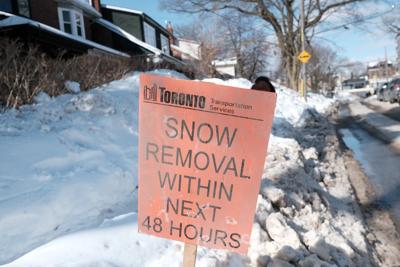What’s that feeling?
Is it the aching in your back from shovelling all that snow? Is it the frozen discomfort of soggy socks and pickled toes from a week of trudging through snow and slush? Is it the pain in your side from when you fell on one of many slip-and-slide sidewalks that are suddenly everywhere? Is it tearful frustration at having to lift a stroller over a giant snowbank at the corner of your street?
Or is it simple d├ęj├á vu?
Because amid the uproar about the response to the major snowfalls last Thursday through Sunday, and the projected three-week timeline for removing all that snow, some of us are old enough to observe that we’ve been through this before. Most of us are old enough, in fact. Even children not old enough to attend school.
To be fair, we did get a lot of snow. More in one week than we got all of last year, and more than we’ve gotten for a long time. Other cities ÔÇö even ones often cited as examples of superior plow-and-removal technique, ÔÇö are having a hard time digging themselves out from under this one.
Montreal is deploying thousands of workers and vehicles to remove record snowfall from the cityÔÇÖs streets. Montreal says it has removed one-third of the snow but it will be at least another 10 days before operations are complete. (Feb. 22, 2025 / The Canadian Press)
That might be a comfort if we were all confident that we’re generally on top of everything and there’s nothing more we could do. But that has never really been the case in amalgamated ╔ź╔ź└▓, has it?┬á
Mel Lastman famously called in the army to help clear the snow after a generational snowfall in 1999, leading to a generation of jokes from across the rest of the country about how defenceless us big-city folks are facing a Canadian winter. That maybe led us to be reluctant to overreact to flurries, but it’s also led us to maybe underreact to storms.
Consider more recent history: In 2018, a late-winter storm caused so many problems that then-mayor John Tory felt compelled to kick off the following winter with a plow-parading press conference, vowing we were now ready. That very winter, in 2019, after a major storm in late January caused an avalanche of complaints, Tory initiated a review of snow-clearing services. In February that year, I wrote complaining that the city didn’t adequately respond because we’re always in denial about snowfall until we’re in a state of panic. In 2022, and then again in 2023, we had major snow dumps that caused a lot of debate at city hall about whether the contract Tory had signed with snow removal services was adequate for the job.╠ř
Even on the single topic of streetcars being blocked by cars that park in the middle of the road due to giant snow banks on the curb ÔÇö therefore shutting down the entire transit line until the driver decides to wander back┬áÔÇö we can grow tired of repeating ourselves: I wrote in 2019 of the possibility of mounting rocket launchers on top of streetcars to vaporize the offenders, before reluctantly deciding that a plan (and fleet of roving trucks) to tow them immediately was more reasonable. But reasonable or not, it has not been implemented, as we’ve seen this week when the TTC had to call ╔ź╔ź└▓ police 200 times in three days about cars blocking the tracks.╠ř
Here’s my point: none of this is new, or even particularly unexpected.╠ř
Why? A gets to the point directly. “Current Council-approved service levels do not account for major snow events, therefore the levels do not set a feasible response time for a storm of the magnitude last experienced in January 2022.” These major snow events, it says, happen approximately every two years. That report goes on to suggest an annual review “to ensure lessons learned from each major snow event drive continuous improvement year over year.” Well, we now have another data point for the next report.╠ř
But you can interpret that line, about council-approved service levels, as a pre-emptive explanation for why a three-week timeline for snow removal might be considered adequate. The city can either budget to deal with major snow events, or it can sit and complain about the effects of them for weeks, over and over again.╠ř
‘It’s like roulette’: How street parking spots became the hottest commodity in cold and snowy ╔ź╔ź└▓
As snow clearing drags on in ╔ź╔ź└▓, some car owners have tried to dig themselves out, while others have abandoned their cars altogether, opting
‘It’s like roulette’: How street parking spots became the hottest commodity in cold and snowy ╔ź╔ź└▓
As snow clearing drags on in ╔ź╔ź└▓, some car owners have tried to dig themselves out, while others have abandoned their cars altogether, opting
I think, given the scale of disruption that happens each time┬áÔÇö┬áparticularly to people with disabilities and seniors, but also to the city’s economy at large ÔÇö we ought to invest in being prepared for a quicker response. Certainly a fleet of tow trucks authorized to clear streetcar tracks first and ask questions later. Likely more snow removal equipment on hand and able to be mobilized more quickly. A better plan to far more quickly clear banks on street corners and at transit stops.╠ř
But admittedly, that costs money. It’s a decision our city council needs to make based on the feelings of residents. Maybe those residents, all things considered, might feel the status quo is fine. But if so, one feeling they shouldn’t have next time this happens is surprise.































To join the conversation set a first and last name in your user profile.
Sign in or register for free to join the Conversation